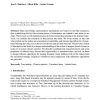Free Online Productivity Tools
i2Speak
i2Symbol
i2OCR
iTex2Img
iWeb2Print
iWeb2Shot
i2Type
iPdf2Split
iPdf2Merge
i2Bopomofo
i2Arabic
i2Style
i2Image
i2PDF
iLatex2Rtf
Sci2ools
131
click to vote
ML
2010
ACM
2010
ACM
Mining frequent closed rooted trees
Many knowledge representation mechanisms are based on tree-like structures, thus symbolizing the fact that certain pieces of information are related in one sense or another. There exists a well-studied process of closure-based data mining in the itemset framework: we consider the extension of this process into trees. We focus mostly on the case where labels on the nodes are nonexistent or unreliable, and discuss algorithms for closurebased mining that only rely on the root of the tree and the link structure. We provide a notion of intersection that leads to a deeper understanding of the notion of support-based closure, in terms of an actual closure operator. We describe combinatorial characterizations and some properties of ordered trees, discuss their applicability to unordered trees, and rely on them to design efficient algorithms for mining frequent closed subtrees both in the ordered and the unordered settings. Empirical validations and comparisons with alternative algorithms are ...
Related Content
| Added | 29 Jan 2011 |
| Updated | 29 Jan 2011 |
| Type | Journal |
| Year | 2010 |
| Where | ML |
| Authors | José L. Balcázar, Albert Bifet, Antoni Lozano |
Comments (0)

